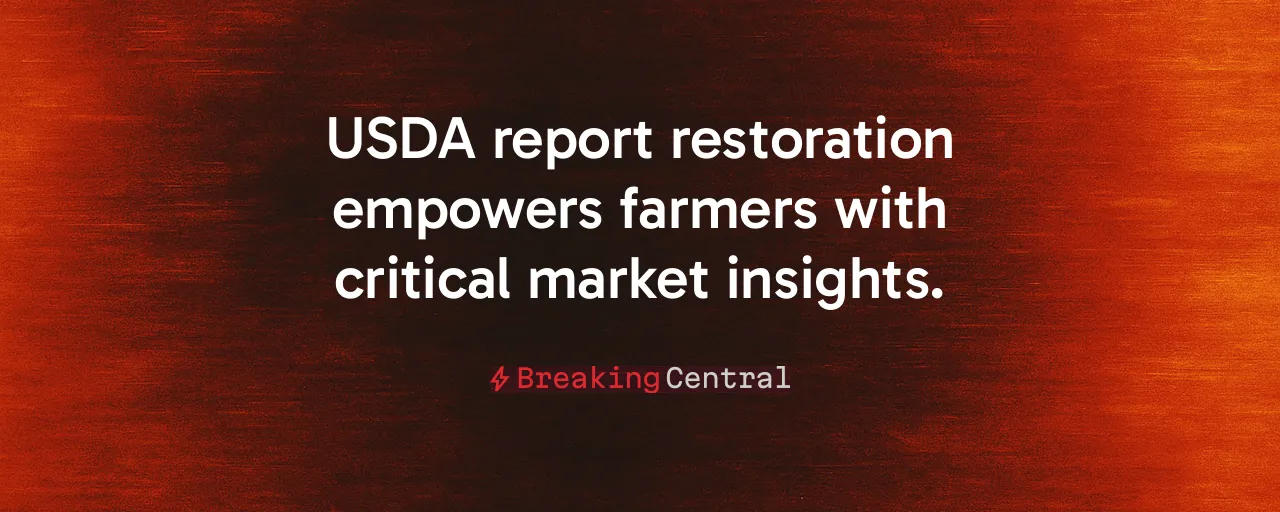Farmers Reclaim Their Edge
American farmers are the backbone of our nation, turning soil and sweat into the food that sustains us. Their ability to adapt and innovate keeps our economy strong and our tables full. That's why the U.S. Department of Agriculture's decision to bring back critical reports, like the July Cattle Report and county-level crop estimates, feels like a long-overdue victory. Secretary Brooke Rollins, by signing the June 2025 World Agricultural Supply and Demand Estimates, has reaffirmed a simple truth: farmers thrive when armed with reliable data.
These reports offer more than numbers. They provide a clear view of global supply and demand for crops like corn, soybeans, and wheat. With commodity markets facing their worst volatility since 2000, driven by erratic weather and trade disputes, farmers can't afford guesswork. The USDA's move signals a commitment to equipping them with tools to plan and prosper.
Why should you care? Stable farms mean stable food prices and vibrant rural communities. When farmers win, we all do. But this progress almost didn't happen. The prior administration's abrupt cancellation of these reports in 2024 left farmers in a lurch, a shortsighted decision that put politics over people.
The restoration of these reports is a step toward fairness. This policy acknowledges farmers know best how to navigate their challenges, reflecting a commitment to trust and autonomy.
Data Fuels Freedom
In today's world, data drives decisions. USDA reports like the WASDE cut through market noise, stabilizing futures prices and reducing trading costs. Research spanning 1985 to 2021 shows that these reports sharpen price discovery, letting farmers plan with confidence. Whether it's scheduling harvests or securing loans, clear data empowers them to act decisively.
This impact extends beyond the farm gate. Exporters, insurers, and small producers all lean on the USDA's 250,000 annual price observations to compete fairly. Shoppers benefit too; 76 percent of Americans now prioritize transparency in food origins, and these reports underpin the trust that drives their choices.
Compare this to the mess of 2024, when canceled reports sparked price swings and higher borrowing costs. Farmers faced uncertainty, and markets faltered. Restoring these tools brings order and empowers individuals to make informed choices, free from government interference.
Resisting Regulatory Overreach
Not everyone agrees with this approach. Advocates for climate-smart agriculture and social equity push for the USDA to collect more data on these areas, arguing it will foster sustainability. But this ignores the cost: added reporting burdens that hit small farmers hardest. The Heritage Foundation's Project 2025 highlights the danger of an overreaching USDA, one that could morph into a regulatory giant, stifling innovation.
Farmers do not need Washington micromanaging their fields or harvesting sensitive data without ironclad privacy guarantees. Data shows 60,000 U.S. farms have embraced practices like no-till farming, driven by market incentives and private analytics, not federal mandates. Trusting farmers with clear, unbiased data lets them adapt without bureaucratic shackles.
This perspective does not dismiss environmental concerns. It prioritizes practical solutions over heavy-handed rules. Farmers, given the right information, innovate better than any government directive could mandate.
The real question is this: Why burden those who feed us with red tape when transparent data already points the way forward?
A Future Built on Trust
The reinstatement of these reports sets a strong foundation. With the agriculture analytics market expected to reach $14 billion by 2030, private innovation is accelerating, but it depends on the USDA's public data as a cornerstone. This balance, government providing essential information, industry driving progress, is what fuels resilience.
Challenges remain. The Farm Bill, once a routine bipartisan effort, now bogs down in debates over nutrition programs and climate policies. Farmers deserve a USDA focused on delivering data they can rely on, not chasing unrelated agendas. Streamlining the agency's mission ensures it serves those who matter most: the people working the land.
The stakes are high. By championing transparency and farmer autonomy, we secure a future where American agriculture remains the envy of the world. That's a vision worth defending.
